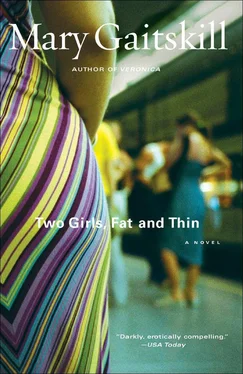Mary Gaitskill - Two Girls, Fat and Thin
Здесь есть возможность читать онлайн «Mary Gaitskill - Two Girls, Fat and Thin» весь текст электронной книги совершенно бесплатно (целиком полную версию без сокращений). В некоторых случаях можно слушать аудио, скачать через торрент в формате fb2 и присутствует краткое содержание. Год выпуска: 2012, Издательство: Simon & Schuster, Жанр: Современная проза, на английском языке. Описание произведения, (предисловие) а так же отзывы посетителей доступны на портале библиотеки ЛибКат.
- Название:Two Girls, Fat and Thin
- Автор:
- Издательство:Simon & Schuster
- Жанр:
- Год:2012
- ISBN:нет данных
- Рейтинг книги:5 / 5. Голосов: 1
-
Избранное:Добавить в избранное
- Отзывы:
-
Ваша оценка:
- 100
- 1
- 2
- 3
- 4
- 5
Two Girls, Fat and Thin: краткое содержание, описание и аннотация
Предлагаем к чтению аннотацию, описание, краткое содержание или предисловие (зависит от того, что написал сам автор книги «Two Girls, Fat and Thin»). Если вы не нашли необходимую информацию о книге — напишите в комментариях, мы постараемся отыскать её.
Review) create a haunting and unforgettable journey into the dark side of contemporary life and the deepest recesses of the soul.
Two Girls, Fat and Thin — читать онлайн бесплатно полную книгу (весь текст) целиком
Ниже представлен текст книги, разбитый по страницам. Система сохранения места последней прочитанной страницы, позволяет с удобством читать онлайн бесплатно книгу «Two Girls, Fat and Thin», без необходимости каждый раз заново искать на чём Вы остановились. Поставьте закладку, и сможете в любой момент перейти на страницу, на которой закончили чтение.
Интервал:
Закладка:
“Why were you friends with him?”
“I had to be. I lived right next to him, and he would’ve killed me otherwise. He almost killed me anyway. He beat the shit out of me a couple of times, and once he pushed me out the third-story window and I had to go to the hospital—”
“Didn’t your parents get upset about this?” Justine vaguely remembered giggling outside the principal’s office with Debby as they listened to the distraught Mrs. Wolcott complain about the D girls pulling down Johnny Wolcott’s pants and spanking his butt.
He shrugged. “There wasn’t much they could do. My mother said I’d have to learn to take care of myself. Besides, he was fun sometimes.”
“I raped someone once, when I was a kid,” said Justine dreamily.
“Yeah?”
She hesitated; since the vanished Dr. Venus, she had never told anyone about Rose. She wasn’t sure why she’d started to tell Bryan; she suddenly wanted to reveal herself to this person who’d recognized the cruel child of Action, Illinois, and stated that he liked her. Nonetheless, as she told the story, which was still painful and sad to her, she disguised the truth of it by relating it with a smile on her face, as if she wanted only to excite him.
He received the story with greed in his eyes and his body in a posture of assessment. “You really were a mean kid,” he finally said.
“It wasn’t just meanness,” she said, confused. “I didn’t know what I was doing. I don’t even know if it was really sexual.” She felt exposed, extended towards him, and a little sick at having displayed her private life for a relative stranger’s titillation — and yet she felt titillated herself.
“It sounds like a military maneuver,” he said. “You entered the city, you pillaged, plundered, mauled everything of value, and withdrew.”
“Nooo.” She ducked her head and giggled. What he said bore no relation to what she felt, but she was seduced by the idea of herself prancing through his imagination as a tiny porn queen while the truth of what had happened lay safely hidden in a pocket of misunderstanding. At the same time, she felt a compulsion to make him understand her, and she was disconcerted to realize that the more he refused to do so, the more desperate the compulsion would become. “Really,” she said, smiling. “It wasn’t like that.” And she told the story again.
Glenda handed her a warm Styrofoam cup of tea with oil glimmering on its surface. Justine sipped and was comforted as associations with safety and ordinariness were triggered by the sweet taste.
“Glenda,” she said, “have you ever had a real anxiety attack?”
Glenda looked at her and nodded; the expression that rose on her face spoke of a deeply disturbing experience, muted with time, and now about to take the tame form of an anecdote. “It happened when I was living in Miami shortly after my divorce from my first husband. I was staying in this sleazy rooming house with cockroaches and I was drinking pretty heavily. One day I made the mistake of calling my ex-husband while I was drinking. He had a woman living with him by then, and I heard one of my daughters call her ‘Mama.’ It was like a knife in my heart; when I got off the phone I almost lost my mind. I ran to the medicine cabinet and took tranquilizers, and when that didn’t help I followed them with sleeping pills. And Justine, when I lay down in my bed I could actually see demons, one black and one red, coming to turn my bed over. It went on for hours, with me fighting to keep them from doing it. And you know, I’m still not convinced that they weren’t there.”
“ Have you ever read Hegel?” asked Bryan.
“I guess, I don’t remember.” She was feeling drunk; she felt herself slouched on the table in an attitude of belligerent indolence. “Why?”
“I was just thinking of an essay he wrote. I can’t remember the name of it. But it has to do with human freedom and its natural limits.”
She came out of her slouch to watch as this new vista of his mental processes displayed itself. She felt confused by the ease with which he alternately skimmed and dove into conversation, one moment leading her down into the tunnels and caverns of his psyche to show her the strange stones and stalactites studding the walls and then, without warning, springing up to run away over the barren surface, laughing like a hyena.
“His basic idea is that people crave freedom but that, because of the realities of their lives, they are inherently unfree. And that the only way people can have a sense of freedom is by taking the freedom of others — enslaving others.”
“That doesn’t sound so original to me,” she grumped.
“So that every human interaction, whether on a national or individual level, is a war over who will be enslaved and who will rule.”
Justine pictured a bleak landscape occupied by two people, one of whom was groveling in the dirt while the other stood exulting in the vast black emptiness of his freedom. “That sounds hopelessly neurotic to me,” she said.
“Well then you must be pretty neurotic to do what you did to that girl in the bathroom. A toothbrush, God.” He smiled as he swigged his beer.
“Fuck you,” she said, and withdrew haughtily into her booth.
“Don’t you think it’s true?”
“I told you a personal thing about myself that’s actually sort of upsetting to me, and you act like it’s some fucking joke.”
He inhaled cigarette smoke and aggressively released it towards her. “It’s so cute when you have these little moments of self-respect and integrity.”
“You’re lucky there’s a table between us,” she said. “If there wasn’t, I’d smack your little face.”
He smiled like an animal showing its teeth.
Something old stirred in her.
“Have another drink,” he said.
She walked into Dr. Winkgard’s office to put his mail on his desk and heard him haranguing a patient.
“Mr. Nelson, I have told you repeatedly, we have run every possible test, and there is nothing wrong with you. We cannot assume that you are sick because of ‘feelings’ and the premonitions of your aunt, who is, I’m sure, a wonderful lady.”
She lingered in the examining room next to his office to hear the rest of this speech.
“However, one thing is for sure and I’ll tell you what it is: If you continue to believe that you are sick, you will become sick. The mind, Mr. Nelson. The mind!”
She had heard this all her life, that if you believe things, they will come true. Bryan had said in a drunken moment the previous night that he could change reality by his perception of it, or something to that effect. Well it didn’t work for her; she had believed in things as hard as she could, she had decorated her beliefs with bells, ribbons, and streamers, she had made winged boats for them to go flying out into the world, and although they had looked wonderful sailing into space, they had crashed in a heap.
Dr. Winkgard obviously didn’t have this problem. She could hear the rippling muscularity of his belief system flexing through his words, taking up all the space in his office, possibly forcing Mr. Nelson to cower under the desk. This was, she supposed, what was meant by having a strong personality. It galled her to think that Dr. Winkgard had a stronger personality than she. Then she thought of Bryan’s nutty Hegelian ideas and was further galled to think that he would see them embodied in the fact that she worked for Dr. Winkgard.
“So,” concluded Dr. Winkgard, “stop worrying yourself into illness, Mr. Nelson. Go and be happy and stop thinking about the demons that populate the dreams of your aunt.”
More demons, thought Justine as she left the examining room. Demons are the theme this morning. The thought frightened her.
Читать дальшеИнтервал:
Закладка:
Похожие книги на «Two Girls, Fat and Thin»
Представляем Вашему вниманию похожие книги на «Two Girls, Fat and Thin» списком для выбора. Мы отобрали схожую по названию и смыслу литературу в надежде предоставить читателям больше вариантов отыскать новые, интересные, ещё непрочитанные произведения.
Обсуждение, отзывы о книге «Two Girls, Fat and Thin» и просто собственные мнения читателей. Оставьте ваши комментарии, напишите, что Вы думаете о произведении, его смысле или главных героях. Укажите что конкретно понравилось, а что нет, и почему Вы так считаете.












